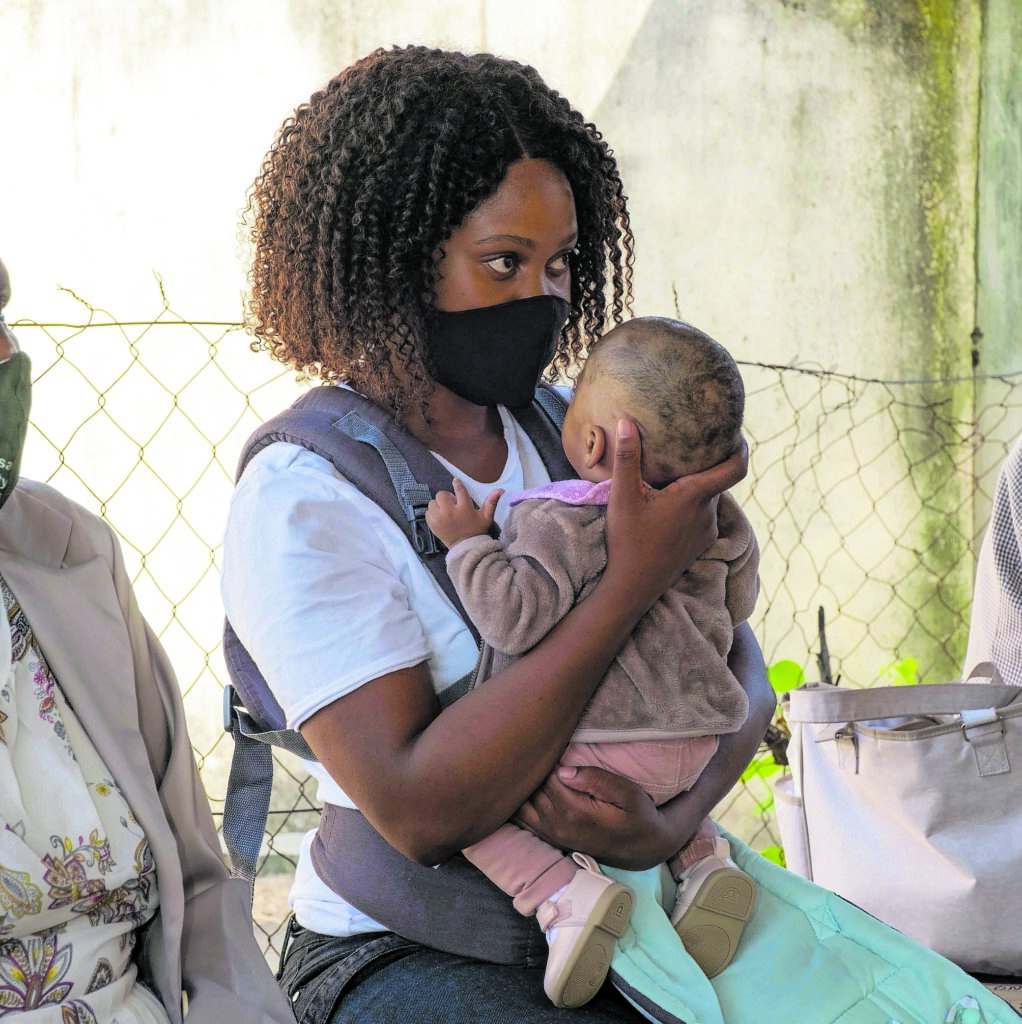World-class facility: Volunteer ophthalmologists are full of praise for the
Themba Foundation’s state-of-the-art clinic. Photo: Alexander Shapiro
For jobless Phindile Mkhabela of Acornhoek in rural Mpumalanga, losing her sight while six months pregnant last year meant she would never see her newborn infant or her 10-year-old daughter again.
That’s besides having to nurse and raise little Trianca, getting her sister Kuhle off to school, clumsily feeling her way through the household chores, or earning any money to supplement her meagre social grant.
For Mkhabela, the light faded slowly over three years, with complete blindness enveloping her world just before giving birth.
“Eventually, I couldn’t read anymore or use my cellphone, no matter how close I held things. I was completely blind for about eight months,” she says.
For Victor Nkuna, a single father, sending one of his seven grandchildren on errands and fumbling for food on a plate, was “painful, hard and stressful,” after he lost his sight, first in the left eye in 2018, followed by the right one in August last year.
“The children would lead me around by the hand. I could see a bit of faint light, but no objects,” he says.
His last temporary job while partially sighted was building outside toilets at a nearby school in 2019.
Mkhabela and Nkuna live near Bushbuckridge, 38km southeast of Hoedspruit and 165km northwest of Komatipoort. According to a Statistics South Africa community survey, 35% of Bushbuckridge youth are neither in employment, education or training — and 64% of them live in jobless households.
Poverty is the everyday norm. Mkhabela and Nkuna are, respectively, an hour and 40 minutes taxi ride from the local hospital.
Small daily miracles
Yet Mkhabela and Nkuna’s tribulations were entirely forgotten one day in March, as head bandages were carefully removed following cataract surgery at the 423-bed Tintswalo Hospital’s state-of-the-art eye clinic.
They’d heard through the community grapevine that visiting doctors there could “wash people’s eyes and let you see again”. Their cautiously contained hope burst into tears of joy upon regaining almost 20/20 vision.
Mkhabela first saw her baby Trianca three months after her birth because the high Covid-19 infection risk at Tintswalo Hospital between January and March had delayed her sight-restoring operation that long.
 Phindile Mkhabela
Phindile Mkhabela
“I was so very happy and shocked to see her,” she bubbles.
These are just two of 40 miraculous cataract removals conducted by a clutch of Gauteng volunteer ophthalmologists who took part in the innovative Tshemba Foundation healthcare project in March, the second one for their discipline this year.
Johannesburg ophthalmologist volunteer Dr Caroline Gooding said the experience was profound. “I can’t tell you how emotional it is when those bandages come off.”
“Overwhelmingly, the expectation level is so much lower than our usual private-practice patients, which makes the surgery so much more amazing and rewarding. They expect so little because they normally get so little. It changes us doctors quite profoundly as well,” she confided.
Her gynaecologist husband, Dr Matt Gooding, introduced her to the Tshemba Foundation upon being asked to do a volunteer stint and hearing about the cataract patient load that was swamping the sole resident optometrist, Dr Othelia Nyati.
Ophthalmologist volunteers have done 450 successful cataract operations since August 2019. While their families go on game drives, they operate almost nonstop, teaming up to act as theatre nurses and surgeons, using specially funded, top-notch ophthalmology equipment.
Visionary philanthropist
The programme was set up two years ago by South African-born philanthropist and British barrister Neil Tabatznik, now living in Canada.
Tabatznik and co-founder Godfrey Phillips were visiting a friend at the nearby Timbavati Game Lodge in early 2019. A game ranger casually mentioned how far his children had to walk to school every morning.
Tabatznik promptly funded the building of a school closer to where most people lived. At the official opening, the local chief said that his people desperately needed a clinic.
“Neil looked around and saw that brick and mortar wasn’t actually the problem – it was human resources,” said Tshemba chief executive Barbara McGorian
The local clinics were there, but without doctors.
“Cataracts are a problem for any community, and for people who live rurally, blindness is a devastating handicap,” said Tshemba medical director Professor John Gear.
The masterstroke was how Tabatznik got specialist local and international doctors to spend their time helping the most desperate.
Tabatznik funded a purpose-built, self-catering game lodge in the Moditlo Game Reserve near Hoedspruit with bungalows and communal socialising facilities. It caters exclusively to healthcare workers with locally scarce specialist skills, half from overseas, half local. They stay for free, bringing food and getting themselves there. They serve an almost bottomless need — 18 000 people await cataract surgery in Mpumalanga alone. This allows the doctors to bring their families to enjoy the bush drives while they use their skills for good.
Enthusiastic reception
Tintswalo’s optometrist, Nyati, while delighted for her patients, is now getting dozens, with word having spread that miracles do happen.
“I’ve got 223 on my waiting list. We prioritise the blind ones, some of whom travel for up to five hours to get here, often from neighbouring provinces,” she says. “Some have over-matured cataracts, and we can’t help. Often, they come for pre-op checks, the op and then post-op assessment — it takes a full three days. There’s no place to sleep here, so they go home. Sometimes they sleep on the waiting benches — they don’t mind. Even the threat of Covid doesn’t put them off.”
Dr Naseer Ally and his wife Sarah, both public sector Gauteng ophthalmologists working at the St John’s Eye Hospital in Soweto, are also early Tshemba volunteers and regulars at the game lodge in Moditlo Game Reserve.
“It’s a world-class set up there, recreationally and professionally. The theatre equipment and layout are an ophthalmologist’s dream. People from all specialities will return again and again, and it will go from strength to strength,” Ally predicts.